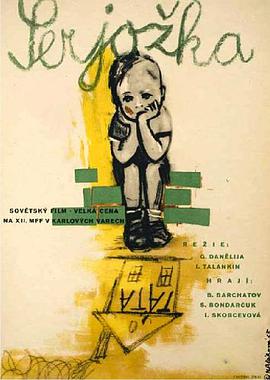1960年捷克卡罗维发利国际电影节最佳导演水晶球奖。
Originally titled Seryozha, the Russian A Summer to Remember was co-adapted by Vera Panova from her own short story. War and Peace director Sergei Bondarchuk plays the new stepfather of young Seryozha (Borya Barkhatov). So close do the stepfather and the boy become in the months following their meeting that, when time comes for the boy to move on in life, he refuses to leave his new dad's side. Their summer idyll takes place on a Soviet collective farm, managed by Bondarchuk and depicted by novice filmmakers Georgiy Daneliya and Igor Talankin in the most glowing and apolitical of terms. Though there isn't much to the plot, the film admirably succeeds as a sort of cinematic tone poem.
From All Movie Guide: Russian filmmaker Georgi Daneliya ranks among his country's most popular directors of satirical comedies. The Georgia-born Daneliya comes from a distinguished family of film performers; his grandmother, Veriko Andzhaparidze, was a famed Georgian silent film actress, his cousin, Sofiko Chiaureli, is also a major actress, and his mother, Meri Andzhaparidze, spent more than a decade at Mosfilm Studios. However, he first chose to train as an architect (perhaps out of respect for his father, an engineer). Following his graduation in 1955, Daneliya worked only briefly in that field when he decided he'd rather be in films, enrolling in Mosfilm Studios' Directors' Courses in 1958. In 1960, Daneliya co-directed Seryozha/A Summer to Remember with Igor Talankin. Two years later, he made his solo directorial debut, Put K Prichalu/The Way to the Wharf (1962). His 1969 comedy Ne Goryuy!/Don't Worry! successfully blended humor and melancholy, a device that would become Daneliya's trademark. In addition to directing, Daneliya co-authors the scripts for his films and occasionally works on screenplays for other directors. Daneliya has won numerous national and international awards for his work. In 1964, his Ya Shagayu po Moskve/I Walk Around Moscow received an honorable mention at the Cannes Film Festival, while in 1975 Afonya received a special award at the All Union Festival, a major U.S.S.R. event. Daneliya's biggest hit in the U.S.S.R., Mimino (1977), earned the special prize at the Moscow International Film Festival and the U.S.S.R. State Prize. In 1991, Daneliya earned the Nika Award (the Russian equivalent to an Oscar) for Best Screenplay for Pasport (1990).
展开

